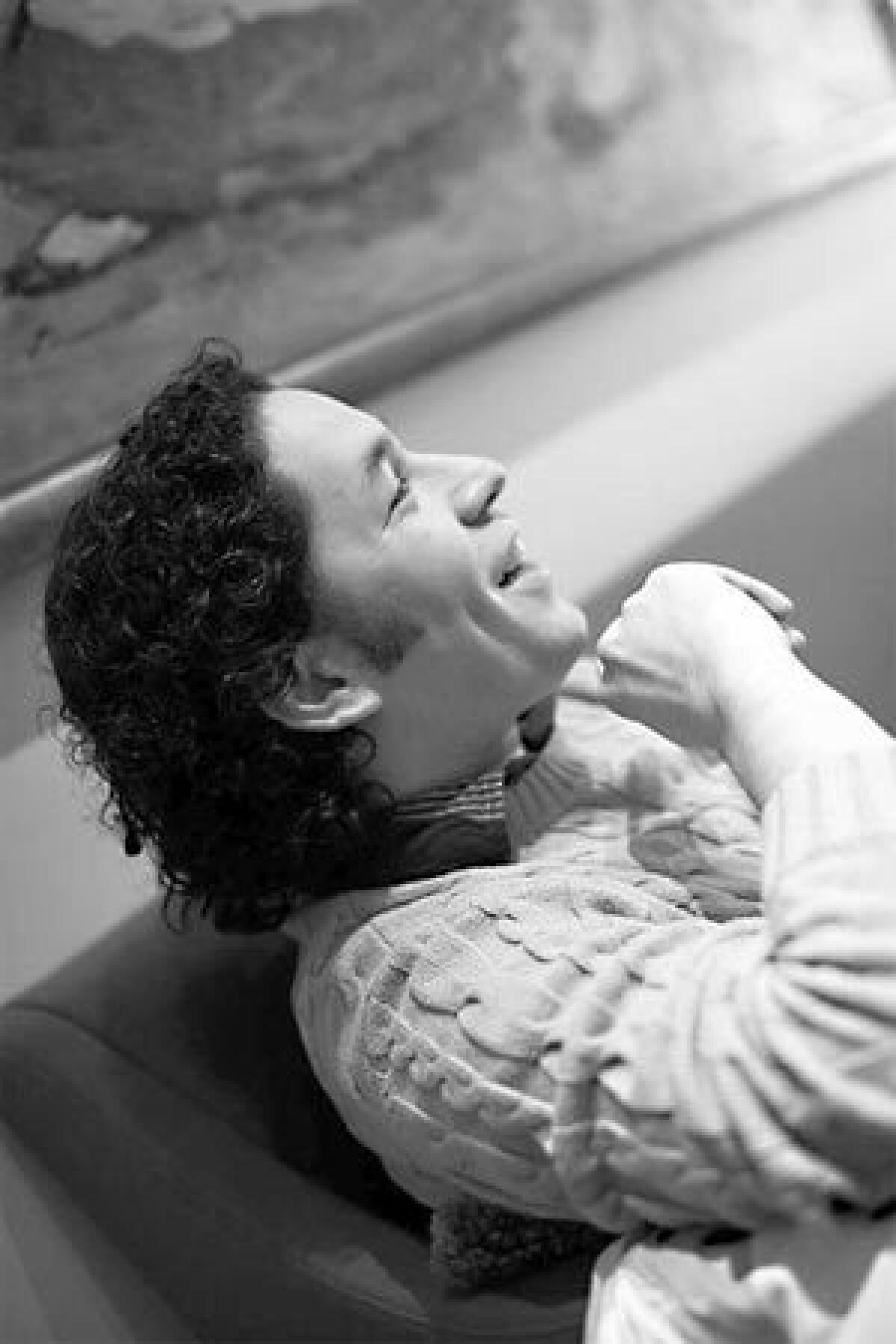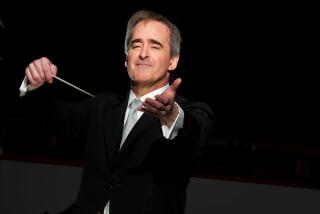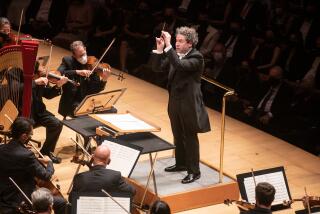Gustavo Dudamel: Welcome to his world

A certain word tumbles frequently from Gustavo Dudamel’s lips these days: marvelous, or maravilloso in his native Spanish.
Ask him about the weeks he spent in L.A. last fall, when he formally took up the reins as 11th music director of the Los Angeles Philharmonic, and he’ll tell you the experience was a marvel, like savoring “a delicious cocktail.”
As a self-professed “lover of the culinary art,” Dudamel pronounces himself more than happy with his new L.A. surroundings, including his favorite restaurant, the Bazaar by José Andrés. “I have eaten very well in Los Angeles,” he said, patting his stomach. “Marvelously!”
FOR THE RECORD:
L.A. Philharmonic: A correction to an April 18 Calendar story about Gustavo Dudamel and the Los Angeles Philharmonic said that the group’s U.S. tour will conclude May 21. The final concert of the tour will be May 22. —
His term for the many composers and performers taking part in the Phil’s current “Americas and Americans” festival, a project he helped conceive and that has his pan-Latin sensibility stamped all over it? Hint: It starts with an M.
And his overall assessment of his newly adopted hometown, where he and his wife, Eloísa Maturén, will be taking up residence in the next few weeks? Uh-huh, you guessed it.
“Los Angeles is a very special city,” he said in Spanish during a dressing-room interview one recent afternoon in this frigid but warmly urbane Scandinavian city, where he has served as principal conductor of the Gothenburg Symphony Orchestra since 2006. “It’s a great ethnic mix, a great cultural mix,” said Dudamel, who counts a Lakers jersey with Kobe Bryant’s number among his prized possessions. “And because of this, it has captured me.”
The 29-year-old Venezuelan conductor also has captured L.A. He has a five-year initial L.A. Phil contract in his pocket, plus prestigious guest conducting gigs in Berlin, Vienna and New York and a recording deal with Deutsche Grammophon.
But some big tests await the young maestro and his orchestra over the next few weeks.
In the two years since the L.A. Phil chose him to succeed Esa-Pekka Salonen as its creative leader, Dudamel has become a celebrity, not only in the United States but throughout Western Europe and Latin America as well. Already, his impact on music, arts education and popular culture generally is being compared with that of Leonard Bernstein’s.
This elevated profile has brought elevated expectations that undoubtedly will surface on the Phil’s tour this summer, its first with Dudamel at the helm. It’s shaping up as an old-fashioned U.S. barnstorming trip that includes stops in San Francisco, Chicago, Nashville and New York.
“When we’re on this tour, we’re going to be under particular scrutiny,” said Deborah Borda, the Phil’s president and CEO, in an interview at her Walt Disney Concert Hall office. “So much has been written now about the Los Angeles Philharmonic and ‘orchestra of the future’ and ‘maestro of the future,’ it’s as if the stakes feel somehow higher. And it’s not that this orchestra has anything to prove; it’s a great orchestra. But you know that the spotlight is on us. And the musicians feel that as well.”
Although the Phil made numerous European tours under Salonen, this will be its first coast-to-coast venture in many years. The programs will include, among other works, John Adams’ “City Noir,” for which Dudamel and the Phil gave its world premiere last October at Disney Hall, as well as one of the conductor’s signature pieces, Mahler’s Symphony No. 1.
Those pieces also will be performed April 25 as part of the “Americas and Americans” festival, which encapsulates one of Dudamel’s pet themes: that the entire hemisphere, from Alaska to Patagonia, is essentially one culture, superficially riven by history and politics. His long-term objective is to help bridge the perceptual gap between the country of Aaron Copland and Leonard Bernstein and the continent that yielded Golijov, Estévez and Astor Piazzolla.
Showing off its new conductor will require a touch of diplomacy by the Phil. When the L.A. orchestra recruited and signed Dudamel, its principal rival suitor was the Chicago Symphony Orchestra. There’s also the question of how the New York media beast, which has praised Dudamel copiously in the past but lately has grumbled about the “hype” surrounding him, will react when the Phil plays at Avery Fisher Hall in late May.
In Los Angeles, where Dudamel’s ebullient image -- baton flying, mad-scientist curls whipping his face -- rises on banners across the city, the greatest challenge isn’t overexposure but over-demand. After last fall’s media blitz, some Angelenos may have gotten the impression that Dudamel immediately would be living year-round in L.A., and they’d catch glimpses of him strolling Hollywood Boulevard or joshing with Jack Nicholson at Lakers games.
But this year especially, the conductor still has major performing and touring obligations, both with the Gothenburg Symphony and the Simón Bolívar Orchestra in Caracas, Venezuela.
“One of the things I’ve heard a lot about is, ‘Well, Gustavo isn’t here at all,’ ” Borda said. That’s a misperception, she said, that will change in coming years as the conductor spends more time in Los Angeles.
“When he’s not conducting he’s out and about the town, going to clubs, going to movies, going out to eat,” Borda said. “When he’s here, he really is here. He’s really in the rhythm of the city.”
At home, wherever
If Dudamel has any apprehensions about his jam-packed spring and summer itinerary, he didn’t show it during his recently concluded Swedish sojourn. In a series of concerts last month, he led the Gothenburg players through rigorous repeat performances of Beethoven’s Symphony No. 4 and Stravinsky’s “The Rite of Spring,” earning loud, standing ovations from the genteel audience.
Afterward, he bantered with the musicians in the backstage bar. “Never argue with the bass player!” he joked, leaning his head against the broad chest of the orchestra’s American double bassist, Charles DeRamus, who grinned down at the conductor from a distance of several inches.
Dudamel’s rapport with the Swedish musicians is matched by their evident affection for him and their interest in his California career. “Gustavo’s just kind of lighting up the Phil,” DeRamus said.
For the last several years, this immigrant-rich, culturally sophisticated Scandinavian port city of about half a million people has provided the conductor with a low-key, relatively sheltered environment in which to develop his technique and ponder his future. There’s no celebrity spotlight here, no Caracas-like entourage of family members and orchestral acolytes to accompany him as he tromps the snow-encrusted streets. (“I still don’t have winter shoes,” he confessed.)
But there are five Michelin-starred restaurants, which Dudamel has sampled, and a cigar shop that sells imported Cuban puros, mere steps from the concert hall. “It’s a city with a very high quality of life,” Dudamel said. “It’s a small city where I have a lot of time to think. The orchestra and I have had a chance to connect very well in this time. I think of all the millions of people in Los Angles. There aren’t that many millions of people in all of Sweden.”
The U.S. tour, which will conclude the Phil’s current season, will be an important progress marker, he said. “It demonstrates what we have done during these months that we have been together. . . . You learn a lot about each other from a tour, musically and humanly.”
For Dudamel, the “Americas and Americans” festival will be something of a South American reunion in Southern California. Several participants are longtime friends and collaborators.
They include the Argentine composer Osvaldo Golijov, whose “Pasión según San Marcos” blends Brazilian and Afro-Caribbean influences into a musical-theatrical recounting of Christ’s Passion; Maria Guinand, who leads the Schola Cantorum of Venezuela chorale group and will conduct Golijov’s epic; and Venezuelan filmmaker Alberto Arvelo, who has made a film to accompany a performance of the festival’s centerpiece, the Venezuelan composer Antonio Estévez’s folkloric theatrical work “Cantata Criolla.”
Arvelo will direct the work, which Dudamel will conduct. Maturén, a trained dancer and choreographer who has produced performance events, will be backstage helping Arvelo to coordinate the multiple moving parts.
The festival also signals Dudamel’s intent to share his prominent L.A. platform with artists from throughout the Spanish-speaking world. “He’s opening roads for so many people,” said Guinand, who has known Dudamel since he was a child performing with youth orchestras in El Sistema, Venezuela’s national youth-music education and training program.
“Gustavo has a vision, a great responsibility, to represent Latin American art to North America,” said Arvelo, who directed the 2006 documentary “Tocar y Luchar” (To Play and to Fight) about El Sistema. “He understands this very well, and it’s something he does in a very organic manner.”
Following up on the free, fireworks-studded welcome he received at last fall’s “¡Bienvenido Gustavo!” concert at the Hollywood Bowl, Dudamel will make three Bowl appearances this summer, including a performance of “Carmen.” That’s a contrast with his predecessor, Salonen, who had to devote large chunks of the summer to his second career as a composer.
Some of those closest to Dudamel still express concern about his relentless pace, the constant jet travel, the three cellphones he carries to juggle his engagements in Europe, L.A. and South America. With summer’s fast approach, he won’t be slowing down.
But at least his North American roots are becoming more grounded. He’s looking forward to spending more time at the L.A. home that he and his wife are renting, which he described as “a very simple house” with a tranquil garden and a pool (“Very important!”).
“Above all,” he said, “what pleases me in a site where I’m going to live, or spend a lot of time, is that it be a location where I can concentrate and where I can, in a certain manner, find an environment that inspires me.”
“Really,” he added, “we were very lucky” to find such a place.
He didn’t use the M-word, but his sentiment was clear.
More to Read
The biggest entertainment stories
Get our big stories about Hollywood, film, television, music, arts, culture and more right in your inbox as soon as they publish.
You may occasionally receive promotional content from the Los Angeles Times.







